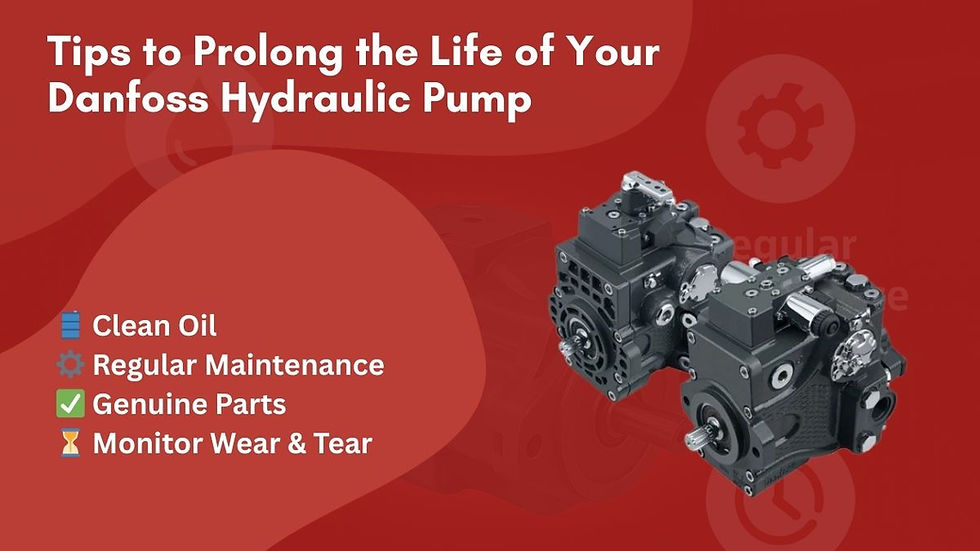What’s the Most Common Failure on a Hydraulic Cylinder?
- excellenthydraulic
- Aug 22, 2025
- 4 min read
Hydraulic cylinders are the main unit behind many machines that we use every day. They

help excavators dig, loaders lift tons of material, and factory presses shape metal parts easily.
Excavators work quietly in the background, turning hydraulic power into smooth, controlled movement. But like any hardworking part, they cannot work forever. When a cylinder starts to fail, the signs are hard to miss: slower operation, weaker power, or fluid leaking where it shouldn’t.
So, what's the number one problem with hydraulic cylinders? The short answer: seal failure. Let’s break it down and look at other common issues, too, so you can keep your equipment running at its best.
5 Hydraulic Cylinder Failure Causes
1. Seal Failure- The Most Frequent Breakdown
Getting frustrated with frequent breakdowns? If there’s one component in a hydraulic cylinder that takes the most beating. Seals keep hydraulic fluid inside and maintain pressure so the cylinder can function properly. Once a seal is worn, cracked, or damaged, fluid leaks start, pressure drops, and performance falls.
Why do seals give out so often?
It gives out because of Contaminated fluid present inside Dirt, dust, and even tiny metal fragments that scratch and wear seals.
Check Heat and age: High operating temperatures cause seals to harden or crack. Over time, even good seals lose their flexibility.
Check Pressure overload: Running the system beyond its design limits pushes seals beyond what they can handle and can result in expensive costs in the future, so be aware.
Check installation: if your cylinder has Incorrect fitting or handling during maintenance, it shortens a seal’s life because of poor installation.
Prevention tips:
Keep your hydraulic fluid clean and change filters on schedule every week.
Stay within recommended pressure levels.
Ensure proper cooling to avoid heat buildup.
Have seals replaced by trained technicians who know the correct fit and method.
2. Check whether your Rod is Damaged?
This can be another reason for the failure of your unit. The piston rod is constantly exposed to the environment. Every time it extends or retracts, it risks scratches, dents, or even bending, which increases the risk, and when that happens, seals fail even faster.
What causes rod damage?
Accidental bumps or impacts during operation or transport.
Unwanted dust is sticking to the rod.
Corrosion from moisture or poor storage conditions.
How to avoid rod problems?
The solution is that you must clean rods regularly and use protective boots in harsh conditions.
Avoid hitting or mishandling equipment.
Store machines properly to keep moisture and rust away.
3. Barrel and Tube Wear failure
Inside the cylinder, there is a tube and a barrel present that guide the piston pump movement how to move. Over time, the friction and contaminants can cause damage to the tube surface, which is more harmful to your machine. There is one worn barrel present inside the pump, which affects seal performance and causes internal leakage which can reduce power over time to time operations.
How to avoid failures?
Routine checkups and proper care can prevent the tube from early damage of the machine. Replacing or rebuilding the barrel may be necessary if wear is significant.
4. Misalignment and Bent Rods
Hydraulic cylinders are designed to work smoothly without any glitches. But if the perfect or if there is a side load, then the rod can bend slightly. Even a small misalignment increases wear on seals and bearings, leading to bigger problems and can lead to high expenses in the future.
How to avoid problems?
Always check alignment during installation and make sure the cylinder is placed correctly for the load it handles. It needs to be installed properly, because poor installation also affects the machine's life and can create future damages.
5. Contaminated Hydraulic Fluid – The Hidden Enemy
Many failures happen because of fluid leaks that can happen over time, which people ignore or overlook, such as dirty hydraulic oil. Contaminants can cause scoring on rods, scratches in the tube, and seal damage. Water in the system can lead to rust and corrosion.
How to prevent it ?
To prevent this, maintain strict fluid cleanliness. Use high-quality filters, test fluid periodically, and follow recommended service intervals.
Read this article to known about- Common Problems of Hydraulic Pump
Why Maintenance Matters
Hydraulic Cylinder Repair is important because failures don’t happen overnight; they give warning signs before failure. It depends on how soon you notice and call experts for repair technicians for fast and better service. A small leak or scratch, if ignored, can lead to a major breakdown and can cost you a little more for the replacement of parts. That’s why regular checks are very important for any machine. Look below for signs –
Fluid leaks around the rod.
Sluggish or uneven movement.
Strange noises or loss of power.
Therefore, catching these early saves time, money, and keeps machines running safely.
Conclusion -
Hydraulic cylinders are high performing units, but not indestructible. Seal failure is by far the most common issue, followed closely by rod damage, misalignment, and contamination. The good news? Nearly all of these problems are preventable through Clean fluid, proper handling, and timely maintenance.
Think of it like this, for example - a few minutes spent inspecting your hydraulic system can prevent so many days of costly downtime in the future. In industries where every hour counts, that’s an investment worth making in heavy machines.
Searching for experts for Hydraulic Cylinder Repair Near you? End your search with Excellent Hydraulic Works- Best Hydraulic Pump Repair Service in Delhi NCR to provide guaranteed and cost-effective services.




Comments